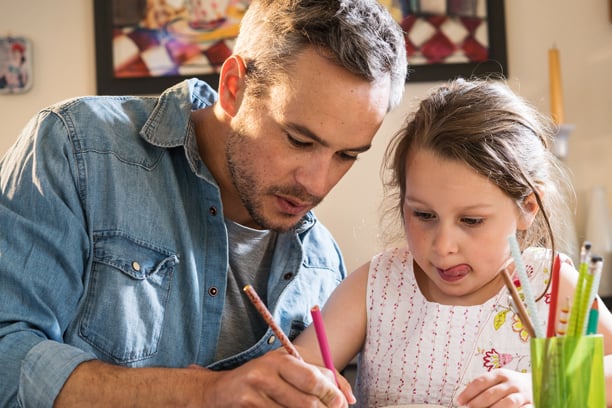Home Schooling
What Is Homeschooling?
Home schooling may be referred to as home education or elective home education.
Educating children at home, works well when it is a positive choice and carried out with a proper regard for the needs of the child. As a parent, you have the choice to educate your child at home, either full or part-time. Your child must receive full-time education from the age of five.
Section 7 of the Education Act 1996 provides that:
The parent of every child of compulsory school age shall cause him to receive efficient full-time education suitable –
(a) To his age, ability and aptitude, and
(b) To any special educational needs he may have,
either by regular attendance at school or otherwise.
In educating your child at home, you do not have to follow the National Curriculum, so you have the freedom to design and provide a curriculum to suit your child’s interests, ability and needs. You may engage private tutors or other adults (both in person or online), to assist you in providing education. You may also use other settings, other than the ‘home’, but must ensure safeguarding procedures are in place.
Homeschooling for Children with SEN
There can be lots of reasons for educating your child at home, particularly if they have special needs. Many children with SEND, for example, find the school environment overwhelming, causing them high levels of anxiety. For some, this can lead to challenging behaviour or refusing to go to school altogether. Other families might feel a school isn’t a good match for their son or daughter’s temperament or abilities and that home-education offers a more tailored, flexible or holistic approach to learning.
There is a wide range of reasons why parents make the decision to home school their child/ren. These include, but are not limited to:
- Ideological or philosophical views which you feel would be better achieved through education at home
- Religious or cultural beliefs
- Dissatisfaction with the school system
- Distance to a local school
- Social communication issues or bullying
- A short-term intervention for a particular reason
- The child’s unwillingness or inability to attend school
- Special educational needs not being met in the school system
- Health issues, in particular mental health
Whatever your reasons for choosing this path, it’s important to ensure that your child is happy and secure and has access to the kind of support that will allow them to thrive.
Children with special needs are equally entitled to be educated at home, regardless of whether they have an EHC Plan or just a diagnosis. The above rules also apply though this situation is slightly more complicated.
With most home-schooling, it is assumed that the parents will be in charge of their son or daughter’s learning and bear any costs. Where a child has SEN, however, they may need specialist support from someone outside the family. An example of this might be a child with dyslexia and ADHD needing a tutor with expert knowledge to come to the home and provide one-to-one lessons.
In situations such as this, the local authority will often pay for this professional help via an EOTAS ‘package’ says Sunil Chothi, an SEN advocate who advises families on all aspects of education law. However, even without local authority funding, parents may still choose to pay for expert support themselves.
“To receive this funding, parents have to demonstrate why school isn’t appropriate for their child,” he explains. “Every situation is different and there can be a range of reasons. The local authority will usually go along with it if there is evidence from CAMHS, for example, or a clinical psychologist.”
SENsational Tutors are passionate about the child’s voice being heard – through whichever means are possible. Whatever decision you make, it is important to ensure that your child is happy, safe and has access to the support that will allow them to thrive.
It is important to discuss your plan to home educate your child, with your child and an appropriate point. This will obviously depend on the age of the child and their ability to understand and communicate.
Article 12 of the United Nations Convention on the Rights of the Child (UNCRC) requires states to provide a right for children to express their views and for due weight to be given in these views, in accordance with the age and maturity of the child. This does not mean that the child has authority to make a decision but that their views should be heard and taken into account where possible.
If your child has Special Educational Needs (SEN) and attends a specialist provision setting or school, you need to have permission from your local authority to educate them at home. If they attend a mainstream school, you do not need permission, even if they have an Education, Health Care Plan (EHCP).
If your child is currently attending a school setting, you should discuss your plan to home educate. The school must accept your decision if you wish to take your child out of school completely.
The school or setting can refuse to accept your plan if you wish your child to have a mix of home education and attending school. Some schools may be open to this idea, but it is at the discretion of the Headteacher and Governing Body – this approach is called ‘flexi-schooling’.
A school must not put pressure on a parent to withdraw their child from school in order to home educate or to avoid exclusion. This practice is called ‘off-rolling’ and is unacceptable. You should inform your local authority if this occurs.
If you choose to withdraw your child from school and then change your mind, you must be aware that there is no guarantee that a place will still be available for your child at the same school.
The local authority has no formal duty to ensure your child is receiving a suitable education at home, but they can make an ‘informal enquiry’ to check this. They can serve a ‘school attendance order’ if they feel that your child needs to be taught in school.
Each Local Authority will have its own published policy on elective home education which should be available on their website.
If your child has SEN, the role of the local authority may be more complex. Your right to educate your child at home applies equally where your child has SEN, whether they have an EHCP or not.
Life-skills, Adventures and Fun
Home-education isn’t only about classroom learning – tutors can also take a young person on days out or play computer games with them to build a relationship. An EOTAS budget can fund these activities as they contribute to a child’s social skills and understanding of the world at-large.
Tutor James is a former SENCO and specialises in working with autistic students one-to-one.
“One of my students lives in central London and I take him out for two hours every morning,” he explains. “We go on walks to Hyde Park and feed the ducks or play football which is useful for him as he needs to lose weight and keep fit. Sometimes we go to the British Museum on public transport – he learns to swipe his card on the bus and interact with people. These things are just as important as academic skills.
“I also take students on shopping trips,” James continues. “I give them a shopping list or use flash cards with pictures. They have to buy, say, three apples so they’re counting and using money. You can teach them without them thinking it’s an actual lesson.”
Homeschooling With An EHCP
Home-Schooling can be Life-Changing
Regulations, budgeting and bureaucracy aside, home-schooling can be a hugely positive step for a child with SEN. With support from tutors who take the time to get to know them as an individual, a young person can learn at their own pace, away from the pressures of a traditional classroom.
The tutor can create a bespoke programme, tailored to the specifications of the EHC Plan (if they have one) and led by the child’s interests and hobbies. Working one-to-one allows trust to develop which, in turn, boosts the student’s confidence and self-esteem – which may have been dented by years of trying to ‘fit in’ in a school environment.
When an EHCP is in place, it is the local authority’s duty to ensure that the educational provision specified in the plan is being made available to the child. In situations such as this, the local authority will often pay for this professional help via an EOTAS ‘package’. However, even without local authority funding, parents may still choose to pay for expert support themselves.
More information can be found on our EOTAS Packages page.


"I needed someone to give me a break homeschooling my son who has ASD & dyspraxia. SENsational Tutors found Stephanie who worked with my son for a day a week for a month. Stephanie has a great, positive, enthusiastic approach. She worked hard to keep my son focused & they had a lot of fun together, playing games & even doing some baking. She was warm & friendly, formed a good relationship with my son, but also gave him boundaries."
Henrietta, mum in UK




